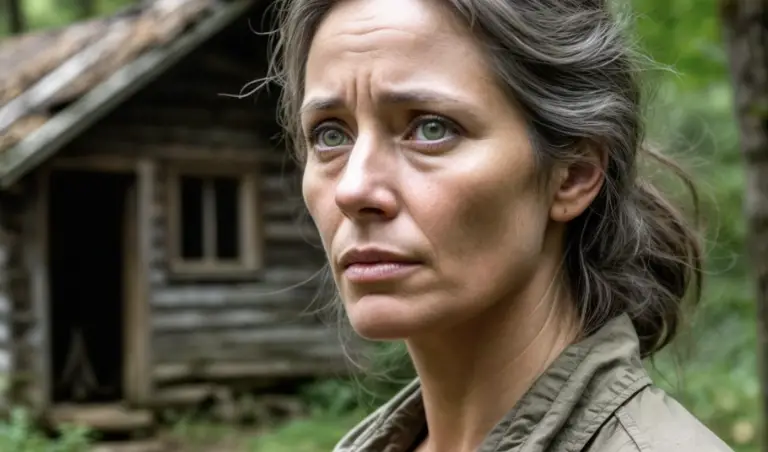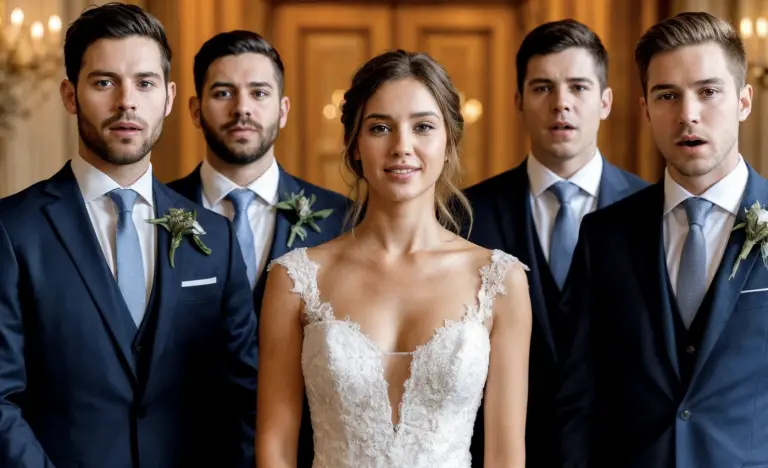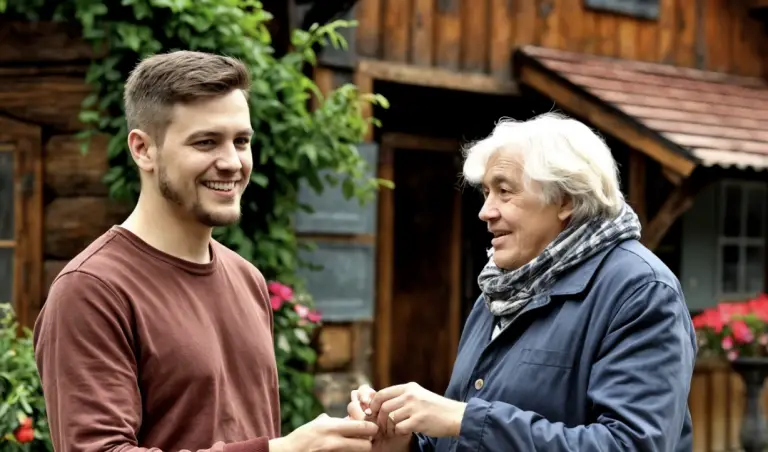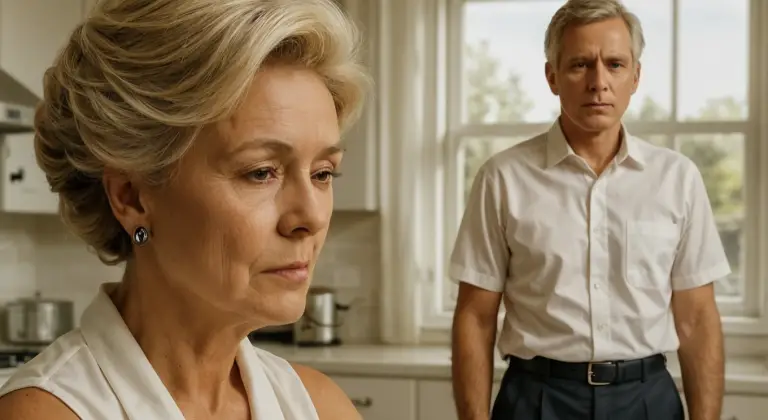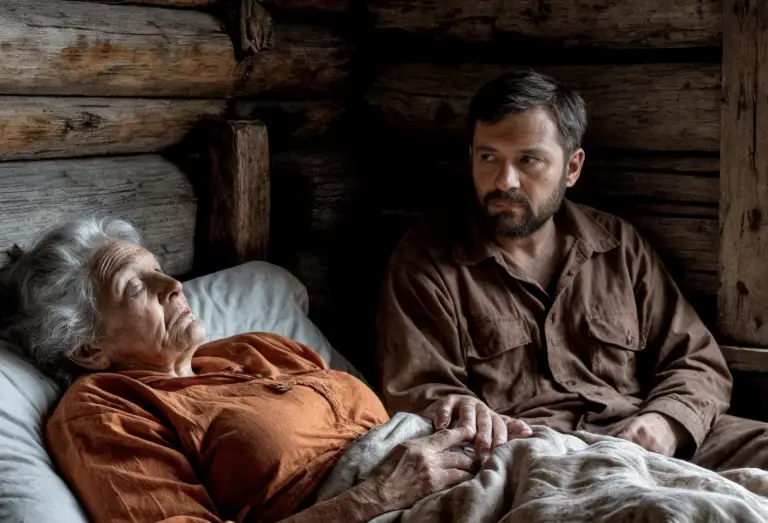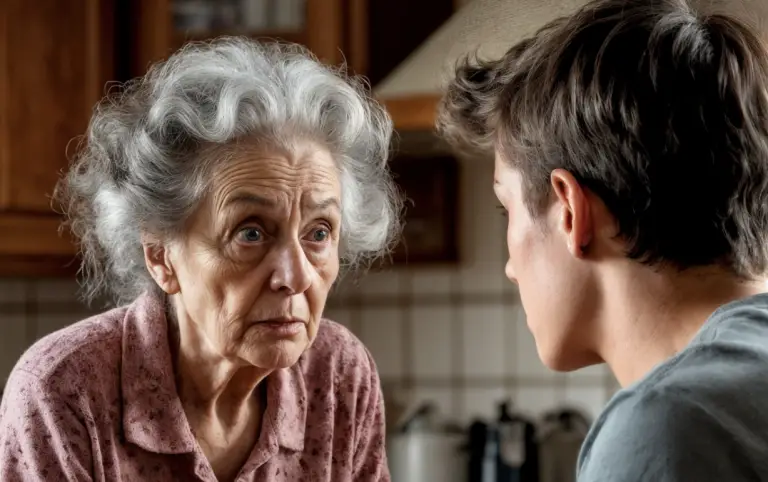I’m filing for divorce.”
Artyom stood in the doorway of the office, his hands shoved into the pockets of his fashionable pants, looking somewhere above Ksenia’s head. His eyes, usually warm and glowing, now appeared cold as ice.
Ksenia put down her planner and slowly raised her head. Her husband’s words hit her like a blow to the stomach, but outwardly, she remained calm, her fingers tightening around the pen.
“Is that so?” she said, trying to keep her voice steady. “And why is that?”
It had been a tough day. Her department head at the publishing house where she worked had canceled yet another project, a client had caused a scene over a typo in a contract, and on her way home, she got caught in the rain. And now this.
Although, if she were honest with herself, she had been expecting this conversation. The last few months of their relationship had felt like a polite cohabitation between two random travel companions. Artyom was constantly on the move, and she was immersed in work. Dinners together had become rare, conversations shallow, and sex felt like an obligation.
Artyom shrugged as though explaining the obvious was beneath him.
“We both know our marriage has run its course. I’ve grown too much…”
“Grown.” Ksenia gave a bitter smile. Five years ago, he had been an insecure, aspiring writer whose first novel had bombed terribly. Then came years of short stories published in low-circulation magazines, barely noticed. But now, when his latest book unexpectedly became a bestseller, he had “grown.”
“Artyom,” Ksenia stood up from the table, “let’s talk calmly. What happened?”
She already knew the answer. A tiny seed of suspicion had sprouted in her a couple of months ago when Artyom returned from yet another presentation with a new scent of perfume on his clothes.
“It’s not about that,” he looked away, and Ksenia understood that her suspicions were correct. “I feel like I can achieve more. And next to you… You’re too ordinary, Ksyusha. I need a muse, not a clerk checking commas.”
It was unfair. Hurtful. And painful.
“Ordinary? Have you forgotten how many nights I spent editing your ‘bestseller’? Have you forgotten how I proofread every page, suggested plot twists, rewrote dialogues?”
Artyom grimaced as though in pain.
“Don’t exaggerate your role. You did the technical work. Inspiration, plot, characters—all of that is mine. And that’s what readers appreciate.”
“And my name as co-author on the cover? We agreed on that!”
“Come on, Ksyusha. What kind of writer are you? You’ll always be a clerk at the publishing house, going through other people’s manuscripts. And me… I’m just beginning my climb to the top.”
“Fame will pass, Artyom. And what will remain? Who will you be with when you’re no longer the trendy author?”
Artyom laughed. His laughter, which once made her heart flutter, now sounded cold and arrogant.
“Oh my, how cliché! ‘Fame will pass, but I’ll remain.’ Is that from a cheap melodrama? My fame is just beginning, dear. As for you…” he gave her a once-over from head to toe, “you’ll always remain the same gray mouse with a savior complex.”
Ksenia held herself back. She wouldn’t give him the satisfaction of seeing her tears.
“So, this decision is final?”
“Absolutely,” he nodded and walked toward the door. “I’m packing my things. I’ll come for the rest tomorrow.”
When the door closed behind him, Ksenia slowly sank into the chair. His words echoed in her head: “You’ll always be a clerk… A gray mouse… I’m just beginning my climb to the top.”
Her eyes found a photograph on the desk—her and Artyom on the day his first book was released. Happy, in love, with hope for the future. Ksenia took the frame and traced her finger over her husband’s face.
“You’re wrong,” she whispered. “I’m just beginning too.”
“My God, Ksyusha, I thought you’d be in shock!” Tatiana looked at her friend in astonishment, who was calmly arranging cups on the coffee table. “How are you holding up?”
A week had passed since Artyom left. A week without his voice, his scent, his presence in the house. Tatiana, upon hearing the news, rushed over with a box of chocolates and a bottle of wine, ready to comfort and support her grief-stricken friend. Instead, she found a composed, businesslike Ksenia, who seemed to have taken her husband’s departure as an annoying but not life-shattering inconvenience.
“What am I supposed to do?” Ksenia poured wine into glasses. “Cry into a pillow? Take tranquilizers? Call him and beg him to come back?”
Tatiana smiled sheepishly.
“Well… yes. That’s pretty much what I did when Dimka left me. I was a zombie for a month, couldn’t eat or sleep.”
“And did that help? Did your Dimka come back?”
“No, of course not,” Tatiana snorted. “He didn’t even call, the bastard. But that’s not the point. It’s just… you loved Artyom. Five years of your life—that’s no joke.”
Ksenia took a sip of wine and gazed thoughtfully out the window.
“You know, Tany, I really did love him. And maybe part of me still does. But I can’t afford to fall apart. Not now.”
“Why?”
“Because if I break down, he wins. He’ll prove that I really am just a ‘gray mouse’ who is nothing without him. And I want to prove the opposite. First and foremost—to myself.”
Tatiana shook her head.
“Honestly, I envy you. When I was left, I turned into a total wreck. But you… you seem to have gotten stronger.”
“Maybe that’s true,” Ksenia smiled. “You know what’s the most painful part? Not that he found someone else. But that he took all the credit for the novel. My work, my ideas, my sleepless nights—and nothing in return, not even a mention as co-author. As if I were not a wife but a free literary slave.”
“He was always a bit of an egoist,” Tatiana said cautiously.
“A bit?” Ksenia smiled bitterly. “It used to seem like an endearing trait of a creative personality. Now I see it’s just plain selfishness.”
The doorbell rang. Ksenia frowned—she wasn’t expecting anyone.
“Probably a delivery mistake,” she muttered, heading to the door.
Standing on the doorstep was Alina Romanovna, her mother-in-law, looking at Ksenia with barely concealed disdain.
“Good afternoon, Ksenia. May I come in? We need to talk.
I have come with just one proposal,” Alina Romanovna sat on the edge of the sofa, keeping her back unnaturally straight. “I hope you will show reason.”
Understanding the delicacy of the situation, Tatiana quickly said her goodbyes, leaving her friend alone with her mother-in-law.
“I’m listening carefully,” Ksenia crossed her arms over her chest.
“Artem said you are getting a divorce. It’s the right decision. You never suited each other.”
“Interesting,” Ksenia thought, “did she think the same when she accepted gifts from me and asked for help with repairs?” But she remained silent.
“I want to offer you compensation,” Alina Romanovna continued. “A reasonable sum of money in exchange for your commitment not to claim that Artem’s romance is a shared asset. No lawsuits, no scandals in the press. A clean break.”
“Compensation? For what exactly? For five years of supporting your son? For hours spent editing his texts? For believing in him when everyone else, including you, thought he was a hack?” Ksenia’s voice grew sharp.
Alina Romanovna pursed her lips.
“Don’t exaggerate your role, dear. Artem is a talented writer. Yes, he went through a creative crisis, but that’s normal for an artistic nature. He just needed the right muse, not…”
“Not who?” Ksenia leaned forward. “Finish your sentence.”
“Not a woman who didn’t support him properly and was more focused on her career than her husband,” the mother-in-law cut her off. “Artem told me that he had to look for inspiration elsewhere. And as you can see, it worked.”
Ksenia stood up abruptly and walked to the bookshelf. Grabbing a thick folder, she threw it onto the table in front of Alina Romanovna.
“Do you know what this is? These are drafts of Artem’s first novel. With my edits, comments, and suggestions. Pages I rewrote ten times because your son couldn’t string two sentences together without grammatical errors!” She snatched a few sheets and waved them in front of her mother-in-law’s face. “Without me, the second novel would never have been finished. It was my plot idea that made the book a bestseller!”
Alina Romanovna looked at her with pity, as though she were mentally ill.
“Poor girl. You’ve gotten so used to living off other people’s achievements that now you can’t accept the fact that Artem succeeded on his own. This is just envy, Ksenia. Mediocre people are always envious of talent.”
She stood up, straightened her jacket, and headed for the door.
“Think about my proposal. It’s your only chance to leave with dignity.”
When the door closed behind her mother-in-law, Ksenia remained standing in the middle of the room, gripping the sheets of paper with edits. “Mediocre,” the word echoed in her head.
“I’ll show you who the mediocre one is,” she whispered.
Three years later
Artem nervously tapped his fingers on the steering wheel. The last traffic light before the publishing house was red, as if mocking his impatience. He checked his watch — only ten minutes left until the scheduled meeting. He couldn’t afford to be late.
The last year had been difficult. His third novel, on which he had pinned so many hopes, had failed miserably. Critics called it “derivative” and “pretentious,” and sales didn’t even cover the printing costs.
“It will get better,” he muttered, trying to convince himself more than the empty car interior. “The new novel will definitely be a bestseller. The second one did well, so the fourth will too.”
The money from the advance on the second novel was long gone. Olga, his new wife — the “muse” for whom he had left Ksenia — was beginning to show signs of nervousness. The last book had to be printed with borrowed money, and now, with the stock gathering dust in warehouses, the debts were becoming harder to ignore.
“You need to go to the publishing house,” Olga had said to him over dinner the night before. “Ask them for a contract for the next book. The advance will keep us afloat while you write.”
“Not a chance,” he snapped. “I’m not going to beg.”
“Sweetheart,” Olga placed her hand on his, “pride is great, but it won’t pay the bills. ‘Palimpsest’ publishing house has always published your books. They have reasons to support you.”
She was right, although he didn’t want to admit it. After a night of reflection, Artem made the humiliating decision to ask for a contract.
The light turned green, and Artem pressed the gas pedal. Five minutes later, he was parking in front of the modern building of the “Palimpsest” publishing house.
He climbed to the third floor and confidently headed to the familiar office of the director. Peter Nikolaevich, whom Artem had worked with before, had always treated him with respect. He knocked and, hearing “Come in,” opened the door.
The director’s chair was turned towards the window, so Artem could only see the back of the person sitting in it.
“Good afternoon, Peter Nikolaevich. Sorry for the sudden visit, but…”
The chair slowly swiveled, and Artem’s words caught in his throat. Instead of the elderly man, Ksenia, his ex-wife, was sitting there. She looked nothing like the “mousy” clerk he had so disdainfully abandoned. She was now in a sharp business suit, with a new stylish hairstyle and an expression of calm superiority on her face.
“Ksenia?” He couldn’t hide his shock. “What are you doing here?”
“Hello, Artem,” she smiled, and there wasn’t a shred of warmth in her smile. “I work here. As the CEO of ‘Palimpsest.’ For the second year now.”
His ex-wife — CEO of a publishing house? The same “mousy clerk” he had so casually discarded?
“I… I didn’t know,” he backed away towards the door. “Sorry, I’ll come back another time.”
“Wait,” her voice stopped him. “Since you’re here, it must mean things aren’t going well, right? Sit down, let’s talk.”
Reluctantly, Artem sank into the visitor’s chair. Shame and irritation fought within him, but he knew he needed the contract.
“The third novel didn’t meet expectations,” Ksenia continued, flipping through some papers on the desk. “‘A pretentious attempt to replicate the success of the previous book,’ if I quote the ‘Literary Herald.’ Sales were below the floor, debts are growing. Am I right?”
Artem didn’t like hearing his failures from her, but he nodded stiffly.
“Well,” Ksenia leaned back in her chair, “I can offer you a contract.”
“Really?” He couldn’t hide his surprise.
“Of course. I have an idea for a novel that will definitely be a bestseller. It will be based on your personal life.”
“What?” Artem frowned.
“It’s simple. A novel about how you met me, how we lived happily, how you wrote your first failed novel, and then — the bestseller, in which I played a direct role.”
“Why would you want this?” Artem asked, unable to hide his suspicion.
“The publishing business, dear,” Ksenia shrugged. “Readers love real stories, especially with dramatic twists. Plus, you are truly talented. The second novel was wonderful.”
“Thank you,” Artem said automatically.
“But there’s one condition,” Ksenia leaned forward. “In the novel, the main character, that is, you, must divorce your… muse, and return to your first wife.
Artem laughed, thinking it was a joke, but Ksenia’s face remained serious.
— You can’t demand that I change my personal life for the sake of a book, — he exclaimed.
— I’m not demanding anything, — she replied calmly. — It’s just the plot of a novel. But life should match art. For believability, you understand?
— You’re out of your mind, — Artem stood up. — I’m not going to divorce Olga.
— As you wish, — Ksenia shrugged. — Think about my offer. The advance will be generous.
Artem headed toward the door, boiling with anger and humiliation.
— By the way, — Ksenia stopped him, — you can say hello to Alina Romanovna for me. Tell her I remember our conversation about “insignificances.”
— She said WHAT?! — Olga was pacing the living room. — That bitch wants you to divorce me and go back to her? What gall!
Artem was sitting on the couch, massaging his temples. The headache was getting worse by the minute.
— I almost quoted her words exactly, — he said tiredly. — It’s just revenge. Now she’s in power and wants me to feel like nothing.
— And what did you say? — Olga stopped in front of him, crossing her arms over her chest.
— That I’m not getting divorced, of course.
— Right, — Olga nodded. — We’ll figure something out. We still have time before the next loan payment, right?
Artem looked away.
— Three weeks. And my mother refused to help. She says I should solve my own problems.
— Damn, — Olga sat down beside him. — But that doesn’t mean you should dance to your ex’s tune. We’ll find another way.
Artem looked at her for a long time.
— What if… — he hesitated, searching for the right words, — what if we just pretend we’ve divorced? A fake divorce. I’ll get the contract, write the novel, make some money, and then…
— Are you out of your mind? — Olga’s eyes widened in shock. — You seriously want me to participate in this… performance?
— Understand, — Artem took her hands, — it’s just business. I’ll write what she wants, or rather what the publisher wants, get the money, pay off the debts. And then we’ll be together again.
— And you’re sure she’ll just let you go afterward?
— Of course. She just needs the novel and public humiliation. Once I give that to her, she’ll lose interest.
Olga yanked her hands away from him.
— The worst part? — her voice shook with anger. — It’s not that this bitch wants to break us up. It’s that you’re so weak that you’re willing to go along with it!
She stormed out of the room, slamming the door. Artem leaned back on the couch and closed his eyes. Something told him this was just the beginning of a nightmare.
— What are you doing here? — Ksenia set aside the documents and calmly looked at Olga, who had barged into her office without knocking.
— Came to talk to the homewrecker, — Olga spat, walking up to the desk. — You think I don’t understand your game? You’re using your position to steal my husband!
— First of all, sit down and calm down, — Ksenia pointed to the chair. — Second of all, I’m not “stealing” anything. I made a business offer to your husband. He is free to accept or refuse it.
— A business offer? — Olga laughed. — You’re demanding he divorce me!
— I suggested a plot for a novel, — Ksenia remained unperturbed. — What happens in his personal life is his choice. If Artem decides to break up with you for the contract, then he values money more than his feelings. But that’s not my problem, it’s yours.
Olga gasped in indignation.
— You… you’re a real snake! Manipulating him, taking advantage of his financial troubles!
— No, I’m a businesswoman, — Ksenia leaned forward. — And you know what’s interesting? The very thought that Artem might prefer money to you terrifies you. Because deep down, you’ve been doubting him for a long time.
Olga turned pale. It was too close to the truth — to those doubts that had been eating at her since Artem first mentioned his “fake” proposal.
— You know what? — Olga composed herself. — I feel sorry for you. You never could let go of the past. And Artem and I love each other and will be together, despite your scheming.
She turned around and headed for the door.
— Maybe, — Ksenia said quietly, watching her leave. — Or maybe not. Time will tell.
A month later, Artem sat in his apartment, staring at the blank screen of his laptop. His last conversation with his mother still echoed in his ears.
— You have to accept the contract! — Alina Romanovna had shouted. — You’re up to your neck in debt! Divorce that opportunist — it’s not such a big price!
— Mom, I love Olga, — he had replied tiredly.
— Love? — his mother snorted. — When you left Ksenia, you also talked about love. And now what? You’re willing to lose everything for this so-called love?
She was right, and it crushed him. If he didn’t get the contract, a financial catastrophe awaited him. The bank had already sent a notice of overdue payment.
— Olga, — he called his wife, entering the room.
— What? — she stopped in the doorway, eyeing him warily.
— I… I’ve started working on the draft for the novel the publisher suggested.
— What? — Olga turned pale. — Without my consent?
— Understand, — Artem stood up and approached her, — it’s just work. I have to do it, or we’ll lose everything. It’ll just be a book, a piece of fiction.
Olga stepped back when he tried to take her hands.
— Just work? — her voice shrilled in disbelief. — You’re going to write a novel about leaving me and going back to your ex-wife! And you call that “just work”?
— I’m not really going to leave you, — Artem ran his hand through his hair. — It’s just the plot, understand? I need the money, and this is the only way to get it.
Olga laughed — loudly, hysterically, with a note of desperation.
— Amazing! You’re selling out for money — and don’t even see anything wrong with it. You know, Artem, you’ve disappointed me. When you left your first wife, I thought you did it for love. Now I realize you’re just a weak man without principles.
— You’re being unfair…
— Unfair? — her eyes flashed with rage. — You’re going to write a novel about how you go back to Ksenia because you need money. And you’re still telling me you love me. What is that, if not betrayal?
Artem was silent, unable to find a response. Olga suddenly calmed down, as if making a decision.
— You know what? I’ll even make it easier for you. I agree to the divorce. Real, not fake. You can write your novel peacefully and go back to Ksenia, not just in the pages of the book, but in real life too.
— But I don’t want a divorce! — Artem protested. — This is just for the contract!
— I want it, — Olga said firmly. — I won’t be with someone who’s ready to sell our relationship for a fee. You’re cursed, Artem. Cursed by your selfishness and weakness.
She turned around and went to the bedroom. An hour later, Olga came out with a packed suitcase.
— I’ll file for divorce tomorrow, — she said, standing in the doorway. — Don’t worry, I won’t claim your non-existent royalties. Unlike you, I don’t need scraps from someone else’s table.
The door slammed behind her.
A week later, Artem sat in Ksenia’s office, handing her a folder with the concept for the novel.
— Here, — he said, not looking her in the eye. — I’ve accepted your offer. Here’s the main plot and the first three chapters.
Ksenia took the folder and began reading carefully, making notes in the margins. Artem nervously watched her expression.
— This… is acceptable, — she finally said, closing the folder. — But there’s one condition.
— What condition? — Artem asked tiredly. — I’ve already agreed to your concept. Olga and I filed for divorce. What else do you want?
— The truth, — Ksenia simply replied. — In this draft, you’re avoiding the sharp corners. You’re creating an image of a misunderstood genius who made a mistake in choosing a woman. No, Artem. If you want the contract, write the truth. The whole truth.
— What truth? — he grimaced.
— Your betrayal. How you betrayed me. How you took credit for my work. How you convinced everyone, including your mother, that I was nothing, and your new lover was your source of inspiration. Then describe how this passion left you when you stopped earning.
— Olga didn’t leave me! — Artem exclaimed. — I…
— Oh yes, oh yes, — Ksenia smirked. — She just agreed to your divorce proposal. In any case, write it as it is. No embellishments, no self-justifications. Your “I” in the novel should be brutally honest.
Artem gritted his teeth. He wanted to throw the folder in her face and leave. But the debts didn’t allow for such luxury.
— Fine, — he muttered. — I’ll give you the truth. All of it, every last drop.
— Sign the contract, — Ksenia handed him the documents. — You’ll get the advance today.
Six months later, the novel was finished. “Betrayal and Return” — that’s what it was called. Artem poured everything into it, fulfilling Ksenia’s condition — he was brutally honest with himself. The novel turned out to be sincere, painful, exposing all his weaknesses and mistakes.
Ksenia personally edited each chapter, and Artem was surprised to discover that her comments were professional and precise. After finishing the final revision, he received the rest of the advance — a large sum that allowed him to pay off his debts.
On his way out of the publishing house, he bumped into his mother.
— Artem! — Alina Romanovna exclaimed. — I was just about to visit you. How’s the novel going?
— Finished, — he replied shortly.
— Wonderful! — his mother beamed. — And when’s the wedding?
— What wedding? — Artem asked in confusion.
— Well, of course! Your wedding with Ksenia. In the novel, you two are getting back together, right?
Artem froze. He had never thought about it seriously. In the novel, the main character did indeed get back with his first wife, but…
— I… I don’t know, — he mumbled. — Ksenia never said anything about a real wedding.
— But you’re back together, aren’t you? Like in the book?
— No. Not yet. Mom, I have to go.
Artem left quickly, but the thought had already settled in his mind. Of course! This is exactly what Ksenia had planned all along — to get him back. And he, the idiot, didn’t realize her game.
That evening, he called her and invited her to an expensive restaurant. Ksenia agreed.
— For the successful completion of the project, — Artem raised his glass of champagne.
— For honesty in literature, — Ksenia smiled, clinking glasses with him.
She looked stunning in an elegant black dress. Artem caught himself thinking that he had never seen her so confident and attractive.
— You know, — he began after a pause, — I realized a lot while writing this novel. About myself, about us, about my mistakes.
— I’m glad to hear that, — Ksenia nodded. — Self-awareness is the main goal of literature.
— Not just self-awareness, — Artem sighed deeply and pulled a small velvet box from his pocket. — Ksenia, I want you to know — everything I wrote about the feelings of the main character, about his remorse and love — it’s true. My truth.
He opened the box, showing her a diamond ring.
— Will you marry me? Again?
Ksenia looked at the ring with an inscrutable expression. Then she gently closed the box.
— No, Artem. I won’t.
— But… why? — he was stunned. — Wasn’t this whole novel about us getting back together?
Ksenia shook her head.
— I never promised I’d accept your proposal. I offered you the concept of a novel, and you agreed. That was the deal, nothing more.
— You… you lied to me! — Artem raised his voice, drawing the attention of nearby tables. — You made me divorce Olga!
— I didn’t make anyone do anything, — Ksenia replied calmly. — That was your choice. You traded your marriage for money and false glory. I just offered a deal, and you accepted it.
Artem turned pale, realizing the truth in her words.
— Fine, — he muttered. — That’s your right. But will the novel be published? When will it come out?
— Never, — Ksenia answered simply. — The publisher decided not to publish it.
— What?! — Artem jumped up. — You can’t do this! We have a contract!
— Which you fully fulfilled, — Ksenia remained unmoved. — And you got paid for it. Nowhere in the contract does it say the book must be published. It’s the publisher’s right to decide whether to release it or not.
— Then I’ll publish it elsewhere!
— You won’t, — Ksenia shook her head. — According to the contract, all rights to the work belong to “Palimpsest.” If you try to publish it anywhere else, the publisher will sue you.
Artem collapsed back into his chair, stunned. Ksenia stood up and placed the money for her share of the meal on the table.
— You stole five years of my life and my work on “your” bestseller. Now I’ve taken your novel — the one that could have truly made you famous as an honest writer.
She headed for the door, but halfway there she turned around:
— You know what’s funny? This novel was actually good. Maybe the best thing you ever wrote. But no one will ever read it.
Artem sat in his empty apartment, staring at a stack of printed pages — the only copy of the novel left with him. “Betrayal and Return” — the novel that would never see the light of day.
The money from the advance had gone entirely to pay off his debts. Olga had left, taking the last remnants of his love for her. Ksenia had rejected him, turning him into a joke. His mother had turned away after learning about the fiasco with the proposal.
He had lost everything — fame, money, love, family. And, worst of all, the chance to ever become a successful writer again. Because his best book was now buried on the publisher’s archive shelf.
Artem ran his hand over the cover. Yes, it was his best novel. The one in which he was finally honest with himself and his readers. The novel in which he admitted his mistakes and found redemption. And now no one would ever read it.
He picked up his phone and opened the last message from Ksenia: “You wanted fame at any cost. Now you have neither fame nor a price. But you have the truth. I hope it will comfort you.”
Artem set the phone down and stared into the void. For the first time in his life, he had no words.
